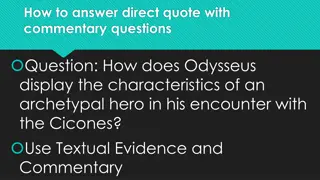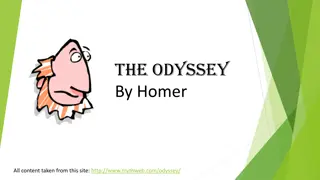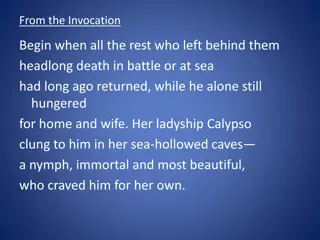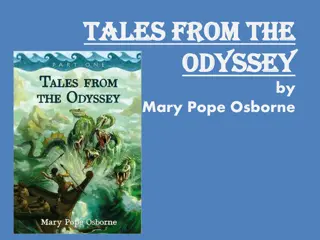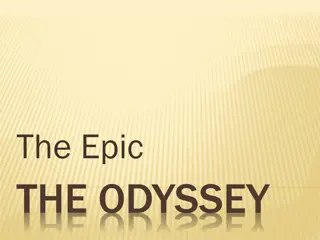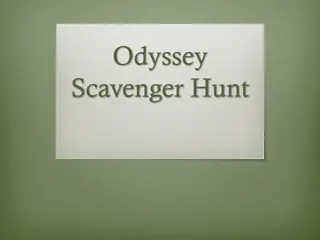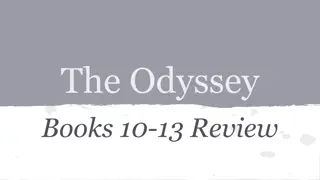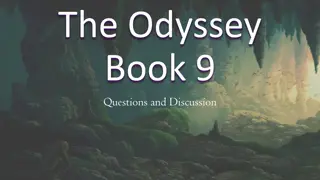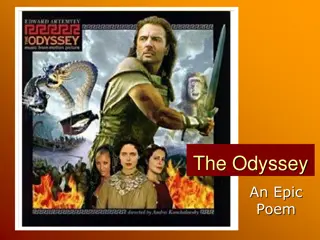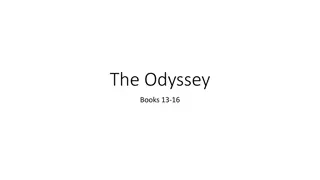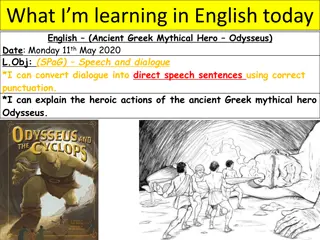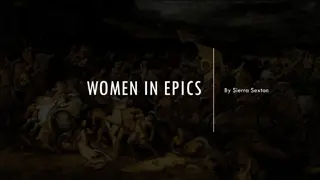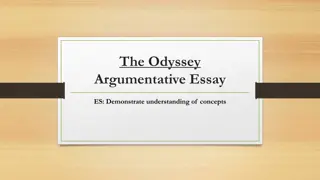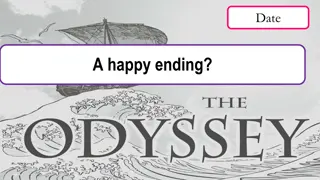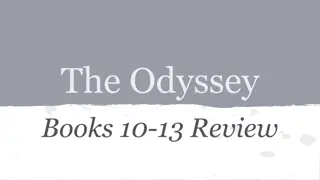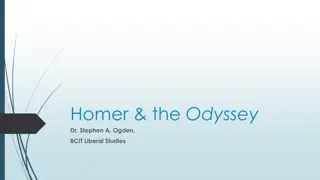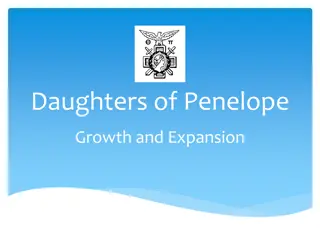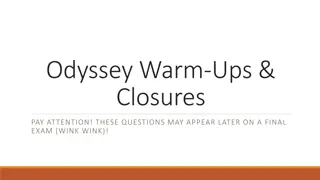The Intriguing Odyssey of Odysseus and Penelope
The epic tale unfolds as Odysseus returns to Ithaca after 19 years to win back his wife Penelope, who is on the brink of remarrying. Despite challenges, Odysseus displays his cunning by remaining disguised and maintaining authority among the suitors. As he navigates the delicate situation, dreams play a crucial role in the narrative, adding layers of complexity and intrigue to the story.
Download Presentation

Please find below an Image/Link to download the presentation.
The content on the website is provided AS IS for your information and personal use only. It may not be sold, licensed, or shared on other websites without obtaining consent from the author. Download presentation by click this link. If you encounter any issues during the download, it is possible that the publisher has removed the file from their server.
E N D
Presentation Transcript
Date Setting the trap
The Wooing of Penelope As we know, having been away for 19 years, Odysseus has finally returned to Ithaca He has learnt many things whilst on his travels, the most important being how much he loves his family & should be with them The only problem is, thinking that Odysseus is dead, Penelope is about to take another husband
Odysseus needs to win back the heart of his wife, Penelope The only problem is he needs to do so without revealing who he actually is as it would seem all of the suitors want his son, Telemachus, dead so they probably won t want Odysseus around either!!! Consider what we know about the character of Odysseus How would he woo Penelope without telling her who he is?
Odysseus Strange Behaviour Examine the opening paragraph of Episode 11: Antinous picked up a stool and he threw it at the old beggar, striking him on the shoulder. But the beggar didn t falter or fall to the ground. He stood firm and the stool clattered onto the floor at his feet. And the beggar walked across and sat down among the shadows by the door of the feasting hall, and he said nothing. He brooded in silence. How would you describe Odysseus behaviour here?
Odysseus still has authority even amongst the suitors, he walks calmly Odysseus isn t frightened of the suitors, no matter how aggressive they are even though he is old , he is clearly still strong as he is not hurt by the stool being thrown at him Antinous picked up a stool and he threw it at the old beggar, striking him on the shoulder. But the beggar didn t falter or fall to the ground. He stood firm and the stool clattered onto the floor at his feet. And the beggar walked across and sat down among the shadows by the door of the feasting hall, and he said nothing. He brooded in silence. Odysseus has chosen to sit partially hidden perhaps this is so that he can watch the behaviour of Penelope & the suitors without arousing suspicion The verb brooding may well suggest that Odysseus isn t happy; however, it is more likely to mean that he is thinking is he hatching a plan?
The Importance of Dreams Before we listen to/read the Episode 11 of The Odyssey, we need to examine a very important event that is about to occur In this Episode, Penelope has a vivid dream & discusses it with the old beggar But what do we know about dreams? What might a dream suggest?
In the real world, dreams are often reflective of our sub-conscious in other words, they may represent things that have been on our mind Dreams can also represent things that we wish or hope for In literature, dreams can be used for in a number of ways Dreams can often be a way for a writer to provide a hint or clue as to a future event or to give a warning to a character
Examine Penelopes dream: In my dream I kept a flock of fat white geese, I kept them in my husband s hall, and every day I fed them with my own hands. And in my dream an eagle swooped down from the mountains, slaughtered all of the geese, sat on a rafter and sang. What do you think this dream represents or foreshadows? Who or what do the geese represent? What about the eagle?
Listen to/read through Episode 11 of The Odyssey: What do you think of Odysseus interpretation of Penelope s dream? What could be the possible consequences for Odysseus (& Telemachus) if his interpretation in incorrect?
Examine the dialogue between Odysseus & Telemachus: Telemachus, Telemachus, come here, listen to me, do exactly what I tell you. All the weapons that are hanging from the walls of this feasting hall take them & hide them in a locked chamber. If anybody asks you where they are, tell them they have become tarnished & smoke-blackened & they have gone to be cleaned & sharpened. Leave only my own bow hanging from its wooden peg on the wall and the twelve ceremonial axes. Why does Odysseus give his son these instructions? What is his concern?
Revisit the opening paragraph to the 3rdsection of Setting the Trap How would you describe the suitors behaviour towards Odysseus? What does it reveal about them? What realisation might this bring about for Odysseus?
And Finally Consider the ending to this Episode: And the nursemaid smiled. And as soon as she was out of sight she made her way out and down and round, and she locked all the doors to the feasting hall, from the outside. Does it not seem odd that Odysseus wanted the nurse to lock all of the doors from the outside? What is the purpose to this request?


